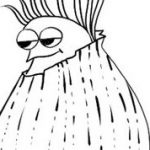Visits are short, but my granddaughter, Caro, is on the computer the whole time building some little cg sculpture. Caro studies art now. I don’t know if she’s any good, but she is immersed in it. Her complexion speaks of overwork and missed sleep.
When I’m gone, you’ll miss me, I want to say. Instead, I talk about what a pretty little woman my own grandma was. I talk about red lipstick and plushy animal-print coats, leggings with rhinestones up the sides. She said strangers would fix her with gentle smiles.
“I remind them of their mom or their grandma who’s dead,” Grandma claimed, but I never noticed the strangers. I thought she was making it all up, but soon I caught myself smiling at old ladies who recalled her in some way, flashy dressers or ladies with thick white hair.
My shoulder tickles, and I give a little gasp and turn. It’s a paper. . . bat? Dragonfly? I take it in my hands.
“Just gorgeous. Did you make it?” I say.
“Just now,” Caro says.
It is like nothing I’ve ever seen, a many-winged creature of white cut-paper filigree, the empty spaces gauzed in bright swirling rainbows of soap-bubble film. It stays vivid even as my hands begin fading away. Time’s up.
“You’ll miss me when I’m gone,” I say quickly on my way out.
Caro turns to me. “You’re already gone.”
#
It’s true. Most of me is gone. My nervous system still occupies a jar of nutritive jelly within some long bank of other jars, or so I’m told. Microscopic wires spark inside that jelly; thick cables coil out of the rows of jars.
So I’m told. It doesn’t feel that way. It feels like I’m standing in a dark closet in Caro’s room, looking through its doorway. I fade into a corridor. I exit a dorm building, step into a hired car, exchange small-talk with the driver.
Apart from the fade out, it doesn’t feel like an unreal world. Flowering cherries line the streets. Pedestrians, other people in other cars, they all seem to be jar-people like me. I’m told it isn’t so.
They’re all part of something I’m making up. If they turn beatific smiles on me, it’s because I expect it.
At home, I put on a housecoat and slippers. I watch a few sitcoms from childhood, have a TV dinner, get into a cool bed and lie shivering until my body heat warms it. More of what I expect.
I need to pee in the night because it’s what I expect, sigh with relief because I expect.
I dread the empty days to come because I expect.
I muse on the memory of the dragonfly. What did it symbolize or promise?
#
“Contact with the beyond is getting less. . . popular, kind of looked down on even,” Caro says the next time I visit. Her hair is greasy and her forehead creased.
“Looked down on. Why’s that?” I say.
Caro frowns, sorry she brought it up. She turns back to the computer and says, “It’s like, you all made your choice to not engage. You and I could be visiting all the time. You could be getting trained to work in the new economy—but you chose to relax, and . . .”
“And?”
“If you’d plug in at all, you’d realize–they’re talking about forcing all the beyond back to work.”
I don’t have to ask how they’ll accomplish this. It’s clear. They’ll threaten to cut those cords, let the jelly gum up around us. Final death, or visits denied.
Or visits not even sought. If they’re unpopular.
Paper brushes against my back. “Time’s almost up,” I say.
“It is up. You’re already fading,” Caro says, so I turn to see her new sculpture while I can. It’s a man-shaped thing, a man carved from a vast tree who is a city who is somehow also a mountain, all of this legible though the whole is carved of white paper. Tiny people bustle up its roads, their carts drawn by tiny paper horses.
I have much time before the next visit, time to work out the symbolism of the sculpture. It recalls Dante’s Purgatorio, recalls Wicker Man. It speaks of Caro’s wisdom and her talent but most of all her own endless toil, a tragedy and a triumph, a gift to those who follow. Human equals work, it says, and it’s a Horatio Alger story, and more.
It tells me, too, of the marvels I might create in this new space if only I would enter. I could be an art student like Caro, or I could go into something more mathematical, or write. Anything she can do on a computer, I can learn to do.
But I worked all my life, I say that night as I lie waiting for the bed to warm.
Enough, I say to my empty rooms in the empty days to follow.
She calls, finally, and I don’t answer. I muse long on how she’ll miss me.
Christi Nogle‘s short stories have appeared in publications such as Lady Churchill’s Rosebud Wristlet, Pseudopod, and Escape Pod. Learn more at christinogle.com and by following her on Twitter @christinogle
Photo by Jack Kaminski on Unsplash






